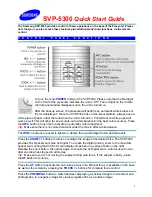
BM-141GE / BB-141GE
33
JAI confirms the following network cards.
NIC
Manufacture Type
PCI-X Bus
PCI-Express
Bus
Intel
PRO/1000MT
Server Adapter
32bit or 64bit
33/66/100/133 MHz
Intel
PRO/1000MT Dual Port
Server Adapter
32bit or 64bit
33/66/100/133 MHz
Intel
PRO/1000GT Quad
Port
Server Adapter
32bit or 64bit
66/100/133 MHz
Intel
PRO/1000PT
Server Adapter
―
( x1 )
2.5Gbps uni-directional
5Gbps bi-directional
Intel
Pro/1000 CT
Desktop adaptor
―
( x1 )
2.5Gbps uni-directional
5Gbps bi-directional
Intel
Gigabit ET2 Quad port
Server Adapter
―
( x4 )
10Gbps uni-directional
20Gbps bi-directional
Intel
Gigabit ET Dual port
Server Adapter
―
( x4 )
10Gbps uni-directional
20Gbps bi-directional
Intel
Gigabit EF Dual port
Server Adapter
―
( x4 )
10Gbps uni-directional
20Gbps bi-directional
8.2.4 Hub
It is recommended to use the metal chassis type due to the shielding performance.
As the hub has a delay in transmission, please note the latency of the unit.
8.3. Recommended Network Configurations
Although the BM-141GE and BB-141GE series conform to Gigabit Ethernet (IEEE 802.3)
not all combinations of network interface cards (NICs) and switches/routers are
suitable for use with the GigE Vision compliant camera.
JAI will endeavor to continuously verify these combinations, in order to give users the
widest choice of GigE components for their system design.
For details of the network settings, please refer to the “Getting Started
Guide” supplied with the JAI SDK.
8.3.1 Guideline for network settings
To ensure the integrity of packets transmitted from the camera, it is recommended to
follow these simple guidelines:
1.
Whenever possible use a peer-to-peer network.
2.
When connecting several cameras going through a network switch, make sure it is
capable of handling jumbo packets and that it has sufficient memory capacity.
3.
Configure inter-packet delay to avoid congestion in network switches.
4.
Disable screen saver and power save functions on computers.
5.
Use high performance computers with multi-CPU, hyper-thread and 64-bit CPU,
etc.
6.
Only use Gigabit Ethernet equipment and components together with the camera.
7.
Use at least Cat5e and preferably Cat6 Ethernet cables.
8.
Whenever possible, limit the camera output to 8-bit.
















































